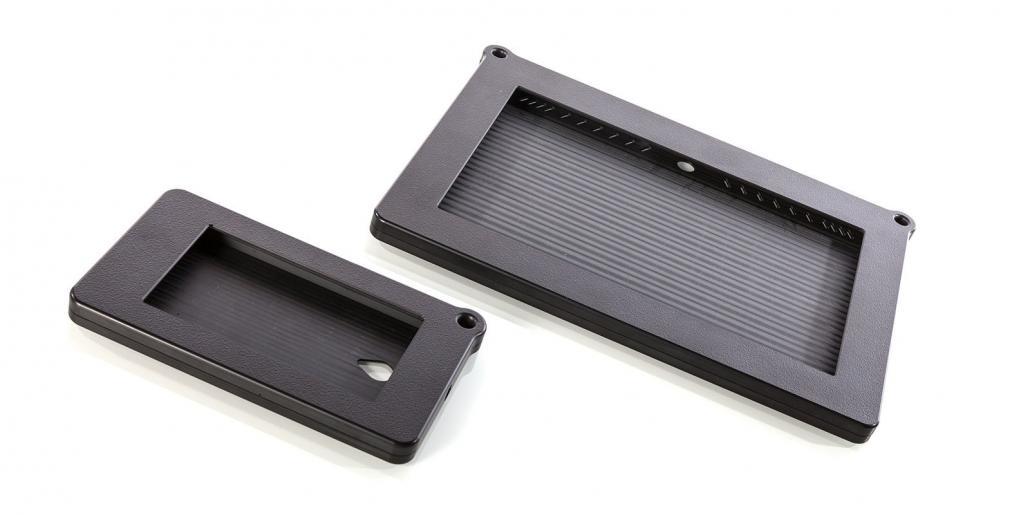Tablet PCs have seen rapid growth in user numbers, applications and usage since the first release of Apple’s iPad 1, the tablet’s ancestor, in 2010. Approximately 149 million tablets are sold worldwide. Due to the open architecture of the Android operating system, the popular touchscreen PCs are also very popular in commercial applications that are not available to the general public via the Google Playstore. This is not surprising, since tablet PCs are more affordable and flexible to use than desktop PCs. It is often sensible to use a tablet housing in order to protect a sensitive device. In this blog posting, you learn more about tablet case manufacturing and applications.
Use of plastic enclosures for tablet PCs
In professional use, it often makes sense, compared to private use, to give the Tablet-PC a stable plastic housing. The tablet housing protects the sensitive electronics of the tablet from shocks or falls. Consequences of a fall are well known to anyone who has ever dropped their smartphone to the ground. The user height is sufficient to damage or even destroy at least the display or the housing of the Tablet PC. Such sensitivities are inacceptable in everyday use. The tablet must be shockproof and adequately protected against falls by using a robust housing. Various factors are important in the construction of such a tablet housing. Among other things, the tablet must fit seamlessly into the housing and all operating elements of this mini PC must be able to be applied by housing applications. mentec® has already designed and manufactured tablet housings for the professional sector for various applications.
Using tablet housings in exhibitions and museums
In public areas such as art exhibitions, museums or animal parks, the application possibilities are very obvious. The tablet, including its housing, serves as an interactive information medium. Such guidance systems are becoming increasingly widespread and are gradually replacing the audio systems that are frequently used. The advantage: the human-machine interaction and the playing out of selected information significantly enhance the user experience for the visitor. To ensure that the tablet does not shipwreck in everyday use and can still be used after many sessions, it has to be packaged in a suitable housing.

Usage of tablet housings in schools and workshops for the disabled
Tablet PCs can be used sensibly in workshops for the handicapped and inclusion/integration businesses. In this case, the tablets are integrated in the shock-resistant, scratch- and drop-proof housings that are required for everyday use to carry out the work. If desired, mentec® can also design and implement such housings with functions for attaching carrying or shoulder straps.

Tablets in housings with wall brackets
Another application for the tablet housing, which is very popular in companies, is the assembly of tablets in wall-mounted housings. The tablet is used as an interactive display or information medium. The tablet can display the next meeting including its participants at the entrance of the meeting room or be equipped with a digital assistant as a control and information system in companies.
POS presentations for tablets
Tablets which are integrated into a housing, can also be used in stationary retail outlets. In this case, the tablet can be used to implement in-store webshop applications. In-store webshops are currently used by many retailers such as Cyberport.de or Hornbach to provide the customer with an overview of the company’s complete product range. Goods that are not in stock in the store can be ordered via the in-store webshop. The customer can then pick them up on site after delivery or have the goods sent home conveniently.
mentec® K-Box® technology: ideal for application with tablet housings
With the help of mentec® patented K-Box® technology, such projects can be implemented within a manageable frame. The initial effort required to produce such a plastic housing is by far not as high as in the injection moulding process. Changes during a model change can therefore also be implemented quickly with K-Box®. Within the scope of a project, the customer has many possibilities to design the housing. Surface painting in different colors is no problem, even if the color is not yet available in the mentec® material portfolio. In order to brand the tablet housing to the customer’s brand, mentec® offers engravings / logo engravings as well as silkscreen or digital prints on the plastic surfaces. The size of the tablet’s display is irrelevant, as the design is carried out individually at the customer’s request. The inside of the housing can be coated with EMV lacquer to shield the device against electromagnetic radiation, if required. Cellular rubber (EPDM) seals can be used to fix the tablet and protect the circumferential display opening from dust, dirt or splash water. For applications in which interaction with the user is not necessary, protective glasses, display panes or display windows can also be inserted into the housing, which are available in a scratch-resistant version too. The housings can also be manufactured in accordance with fire protection class UL94V0. Individual openings for cable access can be provided on the tablet housing. All types of mounting points can be set on the back of the housing, whether for wall mounting, tripod connection or other individual customer requirements.



